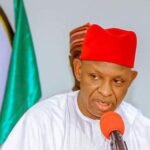The Nigeria Labour Congress (NLC) and the Kano State Government yesterday called on President Bola Ahmed Tinubu to withdraw the controversial tax reform bills from the National Assembly.
NLC President Joe Ajaero made the call in his New Year’s message to Nigerian workers, titled ‘In 2025, Hope is in Our Collective Resolve’.
Kano State Governor Abba Kabir Yusuf, through his deputy, Aminu Abdussalam Gwarzo, declared the government’s position during the 2025 celebrations held at the Filin Mahaha, Kofar Naisa Open Theatre in Kano.
Tinubu had, recently in his maiden presidential media chat, said the tax reforms of his administration had come to stay.
- Insecurity: Ribadu commends Military, police, DSS, others
- FG strengthens move for Simon Ekpa’s extradition
Ajaero called on the federal government to withdraw the tax reform bills so that all key national stakeholders would be part of the process.
According to him, the union’s position on the matter is necessary to promote a dialogue among all the key stakeholders along.
He disclosed that the issue would dominate discussion on the NLC’s national dialogue billed to take place in Ibadan, Oyo State Capital, later this month.
“As we embark on a national dialogue in Ibadan in January 2025, we want to join hands in co-creating a new national tax law that would enjoy wider acceptance and fulfil its purpose of propelling national development which we believe is the main objective of government.
“As we move into 2025, we urge the federal government to prioritise industrial peace by taking social dialogue seriously, pursuing pro-human progress policies, and respecting agreements with trade unions.
“We insist that governments at all levels must comply with the provisions of the 2024 National Minimum Wage Act from the very beginning of the year. Furthermore, given the economic realities imposed by recent government policies, we shall engage the government for a wage review to safeguard workers’ welfare.”
Ajaero also warned that the increasing use of violence in engagements with workers and unions must cease as it is a recipe for industrial disharmony.
He said the labour insisted that governments at all levels comply with the provisions of the 2024 National Minimum Wage Act from the very beginning of the year.
Proposed tax low inimical to Nigeria’s unity – Kano gov
In a statement yesterday by his Chief Press Secretary, Ibrahim Garba Shu’aibu, the Kano State deputy governor said: “This tax reform bill is not the solution to our economic challenges. Kano State stands firmly against any policy that negatively affects the welfare of our people.”
He described the proposed tax law as “ill-timed, lopsided and inimical to the unity of the country. Nigerians in general and the North in particular, are growing under hyperinflation and unprecedented insecurity.
“Therefore, the presidency should pay more attention to tackling extreme poverty and hunger, especially in the northern part of the country.”
The governor highlighted the administration’s achievements in healthcare, education and road construction.
More voices against plan to ‘scrap’ TETfund, NASENI, others
Meanwhile, the alleged move to scrap or whittle down the powers of the Tertiary Education Trust Fund (TETFund) and the National Agency for Science and Engineering Infrastructure (NASENI) in the controversial tax reform bills have continued to draw flak from stakeholders.
The Academic Unions of Universities and Colleges of Education had last week added their voices, warming against killing the TETFund with tax reform.
This is just as the Centre for Democratic Development Research and Training (CEDDERT) insisted that the withdrawal of direct funding to NASENI, TETFund and the National Information Technology Development Agency (NITDA) would kill the agencies.
Earlier in December, the Special Adviser to the President on Information and Strategy, Bayo Onanuga, had dispelled claims of plans to scrap the three agencies.
CEDDERT, in a recent publication authored by Abubakar Siddique Mohammed and Aliyu Rafindadi Sanusi, had called for more consultation on the four newly introduced Tax Reform Bills, saying any attempt to hasten the passage would spell doom for the nation.
According to the authors, “It is misleading to argue that the bills would not lead to the scrapping of some agencies.”
The publication stated that when the chairman of the Presidential Tax Reform Committee was asked about the withdrawal of the direct funding of the three government agencies (The TETfund, NITDA and NASEINI), he said the committee did not recommend the scrapping of any agency.
“That is a half-truth! He suggested that withdrawing their direct funding (in favour of the Students Loan Fund) means that they should be funded through the annual budgets.
“But TETFund was in the first instance created because of the failure of successive governments to make adequate budgetary provisions for higher education. Curiously, he did not explain why his committee did not recommend the funding of the Students Loan Fund through annual budgets. Perhaps there is more to it than he is willing to divulge,” the publication said.
Part X of the Nigeria Tax Bill, 2024 introduces the “Development Levy”, which aims to consolidate all levies imposed on companies into one Fund and proposes far-reaching fundamental changes to the application of the Fund.
CEDDERT noted that “although consolidating the current levies into one helps simplify the tax structure and addresses the issues of multiple taxes, the proposed application of the revenue from the levies has dire implications for the government agencies funded by these levies.
“Based on the proposition of the bill, all companies shall pay the following percentages of their assessable profits into the Development Levy Fund as follows: a) 4% in 2025 and 2026 b) 3% in 2027, 2028 and 2029 c) 2% in 2030 and afterwards into the Students Loan Fund.”
Analysing the implication, the researchers noted that the bill abrogates the TETFund by 2030 because “the TETFund is a special intervention which is impossible to be funded through annual budgetary provisions sustainably.”
“Without the TETFund, there will be no capital intervention in public universities after 2030. It also means that the activities of TETfund will slow down from next year since its allocation will be substantially reduced from 2% of profits to only 1% (i.e., 25%*4%) in 2025 and 2026,” the publication stated.
COEASU cautions FG on TETFund
Colleges of Education Academic Staff Union (COEASU), however, kicked against the tax reform while rejecting the aspects of the proposed tax administration, which aims to withdraw or impede on the source of funds to Tertiary Education Trust Fund (TETFund).
The president of COEASU, Smart Olugbeko, had, in a statement, said such injury, if allowed to stand, is bound to undermine the development of public tertiary education in Nigeria.
He said the union noted with serious concern the inimical effect of the proposed tax reforms of the federal government on Tertiary Education in Nigeria.
“The tax reform is nothing but a dangerous ambush aimed at destroying public tertiary institutions in Nigeria. TETFund is a brainchild of the struggles of academic staff unions in tertiary institutions led by the Academic Staff Union of Universities (ASUU). Prior to the establishment of TETFUND, infrastructure in tertiary institutions were in shambles and the government of Nigeria became clueless on the way forward until the Academic Staff Union came up with a brilliant idea of a Trust Fund for the education sector.”
He said the government had not shown serious concern for education and has wilfully destroyed public institutions through its policy somersault and lack of commitment to Education.
“The aspect of the tax reform that allows TETFund to be stifled by its source of Fund will gradually drag tertiary institutions into the stock market making them become capitalistic ventures for the highest bidders,” he added.
Daily Trust recalled that in a recent interview with journalists, the president of ASUU, Prof. Emmanuel Osodeke, slammed the proponents of some parts of the tax reform bill for positing that both NASENI and TETfund should not be funded independently again.
Osodeke, while arguing that these are the only agencies that fund education and research in tertiary institutions, recalled how they came about the agencies decades ago to resolve funding gaps in the tertiary institutions.
He also faulted the students’ loans being publicised by the federal government, saying it should be a grant if at all the government wants to continue to increase school fees arbitrarily.
He said: “The one that really concerns me most which is at the development level is this. You see, in 1993, the military then, because when we used to have people who they say could not fund it, they now challenge us to provide a way we could solve and provide some money for the universities so that we can be moving the dollar to the world. That is the only third fund.
“We say it was an ETF, Education Trust Fund. In 2011, after a lot of struggle, it became the Tertiary Education Trust Fund. And we met, looked at it, I said why not allow companies and industries to contribute 2 per cent to funding education? We didn’t call it tax. Contribute 2 per cent to funding education.
“And those 2 per cent you are contributing then, you know what we call it? We call it investment because you are investing in education, because the products of those tertiary institutions are just going to work for you, just 2% of the profit of the company, which the military accepted wholeheartedly.
“Then somewhere in 2001, it was increased to 2.5 per cent and in 2013 to 3 per cent. And when you go back to all Nigerian universities, 90 per cent of the structure, fiscal structure you have for there are a product of this particular struggle, the third fund.
“But this tax, this Bill is saying that by 2030 it should be scrapped. It should be scrapped and that by 2030 they should merge them together with NASENI and NITDA and then 4 per cent, then a release of 2 per cent in 2023.
“But there have been several explanations about that point, and what they said was, first, NASENI, third fund, NITDA is funded through budgetary provisions, and company income tax and other taxes paid by the same businesses that are overburdened.”

 Join Daily Trust WhatsApp Community For Quick Access To News and Happenings Around You.
Join Daily Trust WhatsApp Community For Quick Access To News and Happenings Around You.


